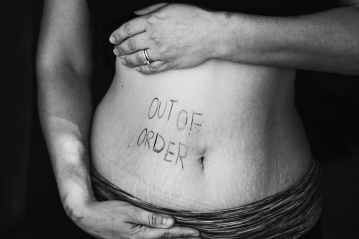My GI tract has been through a lot. About eleven years ago, I started having esophageal spasms and acid reflux that couldn’t be controlled with anything short of proton pump inhibitors (PPIs). I never managed to get off these drugs. An attempt last year ultimately led to the discovery of a carcinoid tumor in my stomach.
After having my tumor removed surgically, I was off PPIs for a few months, but ended up back on a low dose. This turned around my acid reflux problems, but I continued to experience ever more regular bloating and gassiness. I began to be unable to fit into some of my clothes despite having lost fifteen pounds since my tumor removal surgery. My doctor suspected I had small intestinal bacterial overgrowth (SIBO). I took a hydrogen breath test in mid-March, which showed I did indeed have this condition.
 Even before taking the test, I turned to Dr. Google to find information about SIBO. It wasn’t that helpful beyond a basic description of what SIBO is: overgrowth of bacteria from the large intestine in the small intestine. These bacteria produce methane and/or hydrogen when they get undigested food (most sites say carbohydrates, specifically), which, of course, there is a lot of in the small intestines.
Even before taking the test, I turned to Dr. Google to find information about SIBO. It wasn’t that helpful beyond a basic description of what SIBO is: overgrowth of bacteria from the large intestine in the small intestine. These bacteria produce methane and/or hydrogen when they get undigested food (most sites say carbohydrates, specifically), which, of course, there is a lot of in the small intestines.
Beyond those basic facts, the causes and treatments for SIBO diverge wildly and reputable sites with comprehensive information are pretty much nonexistent. Causes include celiac disease, diabetes mellitus, motility issues, IBS, trauma to the intestines, stress, and aging. Turns out a few sites also mentioned a link between PPIs and SIBO. Sigh. Another crappy side effect of this drug that seems to be the only thing that allows me not to have constant acid reflux and frequent esophageal spasms. (In case you didn’t read about my cancer experience, PPI use is also correlated with the development of carcinoid tumors).
Treatments include antibiotics, which is what my gastroenterologist prescribed; diet changes, although good luck deciphering which diet you should use; herbal antibiotics; prokinetics; and probiotics. Some sites mention one or a few of these. Few list all of them. Some studies have found probiotics not to be helpful, others found certain strains to work. Some doctors use prokinetics, others don’t. And, of course, there are a ton of naturopathic sites decrying antibiotic use, although I can find very few actual people who say that they got anywhere treating SIBO without at least using an antibiotic initially.
 Confusion aside, I went ahead with the antibiotic treatment and also started a food diary to identify some triggering foods. I’m currently avoiding dairy, whole nuts, cruciferous vegetables, and legumes; and limiting my intake of sugar and grains. None of the recommended diets I came across had all of these foods on the do-not-eat list, furthering my confusion. The diet somewhat helps, but I still get randomly bloated for no discernible reason. And most of the time I eat grains (which all the diets say to avoid), I have no symptomatic response. The antibiotics have lessened my symptoms, but they aren’t gone. Post antibiotic, I resumed taking probiotics. I’m beginning to think I am just going to be somewhat to very bloated for the rest of my life. I hope my intestines just need some time to heal and eventually I can eat and dress normally again. All of my favorite foods are on my do-not-eat list. Half the clothes in my closet accentuate my distended belly, making me not want to wear them. Most of my pants are too uncomfortable to wear. Maybe I’ll start buying maternity clothes.
Confusion aside, I went ahead with the antibiotic treatment and also started a food diary to identify some triggering foods. I’m currently avoiding dairy, whole nuts, cruciferous vegetables, and legumes; and limiting my intake of sugar and grains. None of the recommended diets I came across had all of these foods on the do-not-eat list, furthering my confusion. The diet somewhat helps, but I still get randomly bloated for no discernible reason. And most of the time I eat grains (which all the diets say to avoid), I have no symptomatic response. The antibiotics have lessened my symptoms, but they aren’t gone. Post antibiotic, I resumed taking probiotics. I’m beginning to think I am just going to be somewhat to very bloated for the rest of my life. I hope my intestines just need some time to heal and eventually I can eat and dress normally again. All of my favorite foods are on my do-not-eat list. Half the clothes in my closet accentuate my distended belly, making me not want to wear them. Most of my pants are too uncomfortable to wear. Maybe I’ll start buying maternity clothes.
I haven’t resigned yet. I am trying some herbal antibiotics, and a variety of other herbal supplements and foods that have been shown to help the GI tract. I see my gastroenterologist again in about a month. I might message him sooner to see if he has any further suggestions. After all, some sites have suggested further tests I could discuss with him. In addition, I might gear myself up for an extreme elimination diet to see if it makes a difference.
Hope, however, is an extra slippery thing for those of us who are prone to depression.
You can find other A to Z Challenge blogs here.


This sounds incredibly difficult. I did an elimination diet called Whole 30 not long ago, and it really changed my life. However, it sounds like you’re already eliminating a lot of things! I think probiotics have a lot of promise, but I don’t dare try them because finding the right one is apparently harder than it sounds. Good luck with this.
Melanie’s Stories
LikeLike
I am familiar with the Whole 30 diet. I am considering trying the Paleo Autoimmune diet, which is super restrictive. If I can stay on it for a few weeks, it should allow me to more easily see if a particular food is a trigger–if I feel better on that diet, that is. I did a ketogenic diet that actually made me feel worse and led to me figuring out I have SIBO. One reason I think dairy is a trigger, as well as nuts.
LikeLike
My mother was diagnosed with SIBO and was so confused about what she could and couldn’t eat that she passed out from not eating enough. It’s a complicated set of issues, and I wish you the very best!
LikeLike
That’s awful about your mother. I have definitely had days where I knew I wasn’t eating enough but just couldn’t bring myself to eat. Or I was just afraid to eat.
LikeLike
I know how you feel in terms of food diary and trigger foods. I went through that with my chronic illness. A lot of my favorite foods ended up on the do not eat list. I hope you get it sorted out.
~Patricia Lynne aka Patricia Josephine~
My A to Z’s of Dining with IC
Patricia Lynne, Indie Author
LikeLike
Me too. It’s a tricky thing for sure.
LikeLike